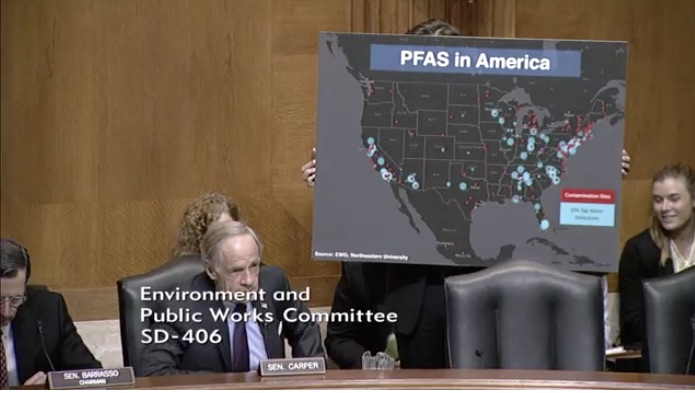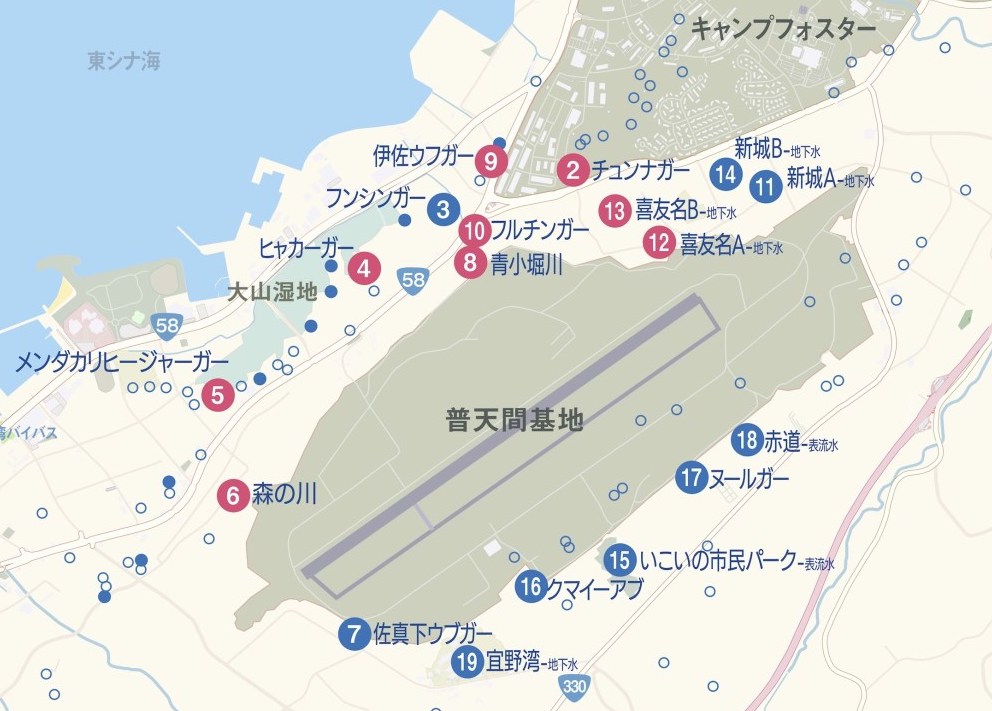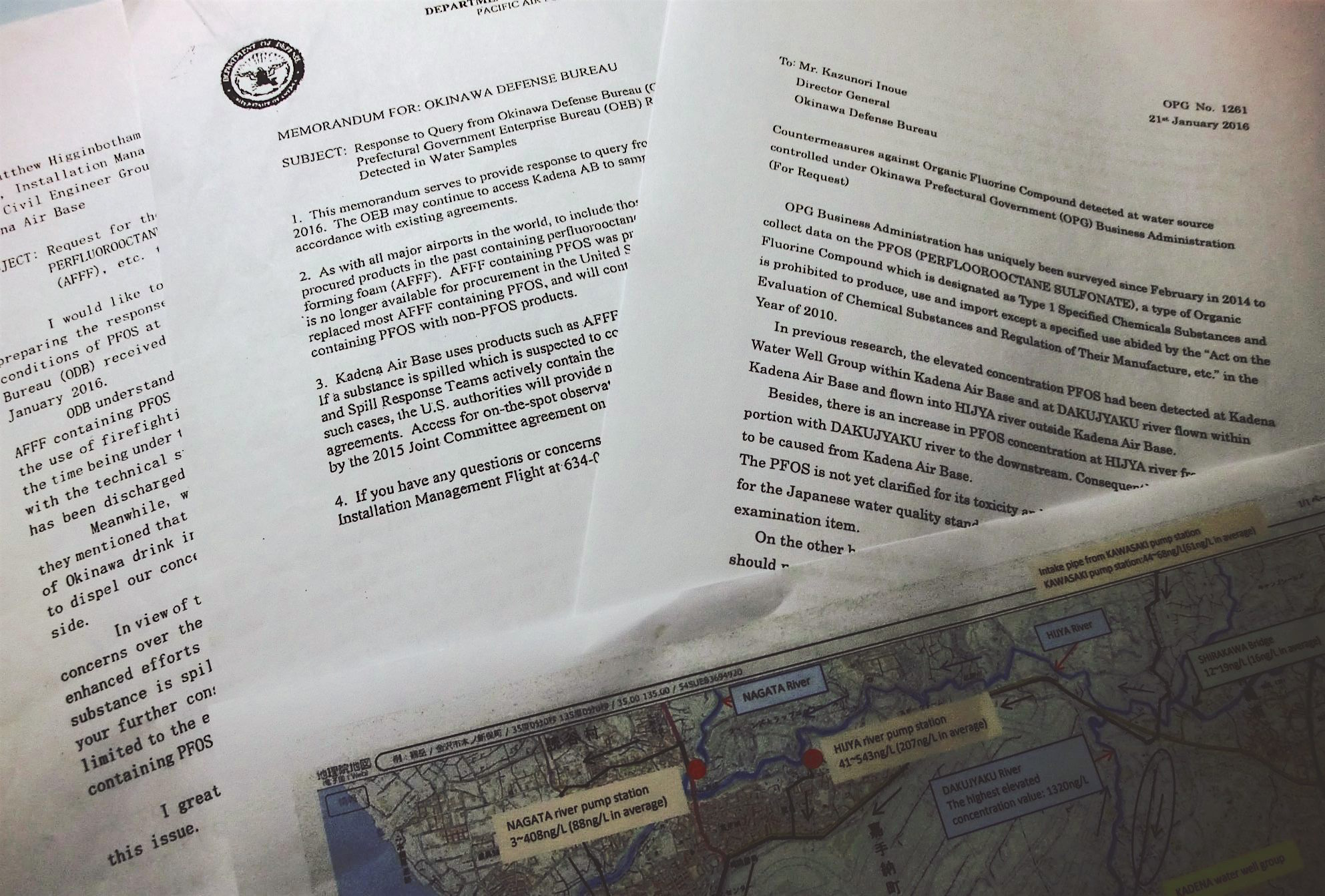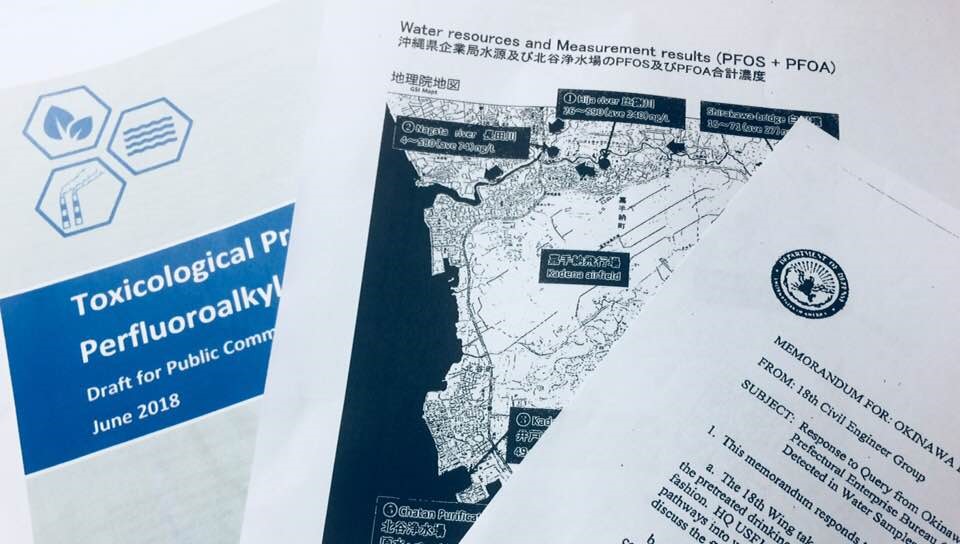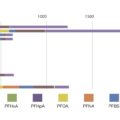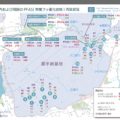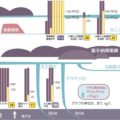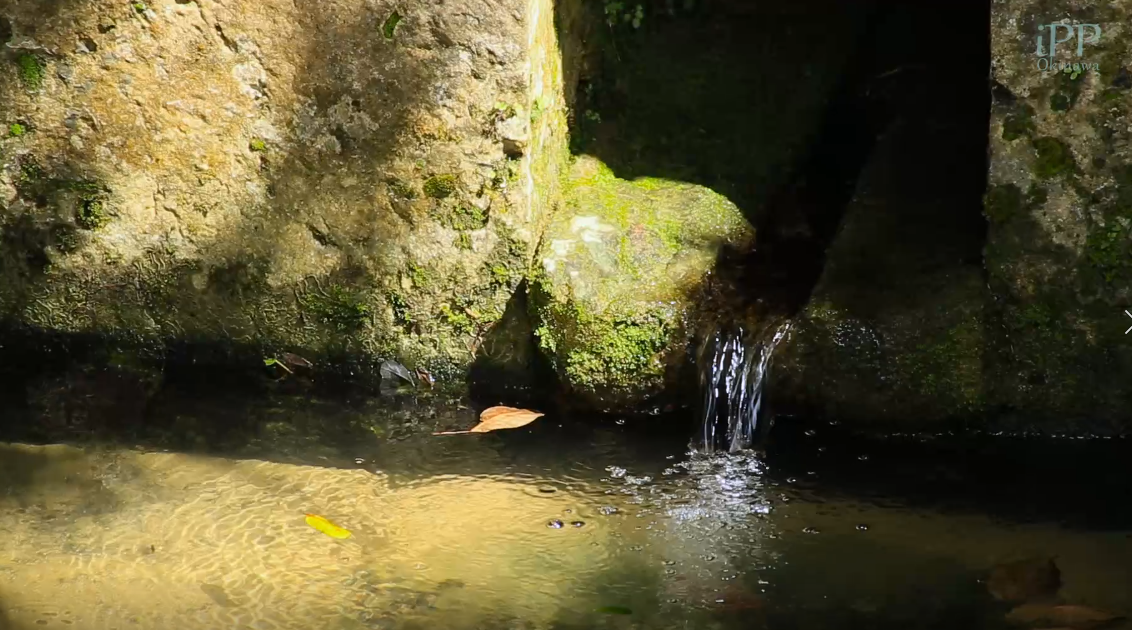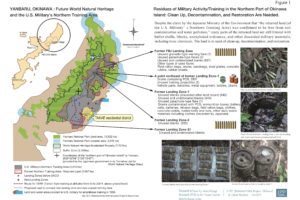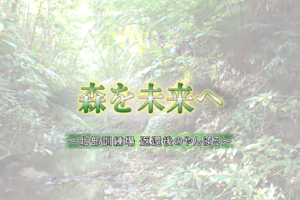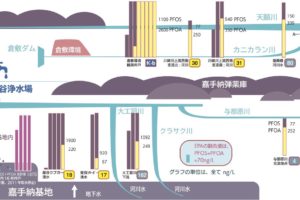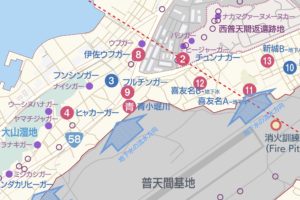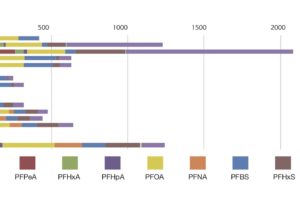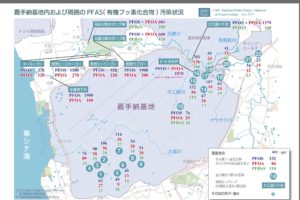目次
The Informed-Public Project (IPP))は公式に米国へ声を届けることを始めました。
米国連邦議会の上院「環境と公共事業委員会」の2019年3月28日に行われたヒアリングにIPPからの声明を出しました。
声明はIPPのサイトの以下の英文記事に掲載しています。
Okinawa’s Concern Over PFAS Reaches the U.S. Senate
(「沖縄のPFASへの懸念が米国上院に届く」)
原文は記事の末尾に貼り付けています。
声明は他の米国のコミュニティからの手紙とともに委員会に公式に記録されました。
声明提出の経緯:米国アクティビストとの連携
米国でも有機フッ素化合物(PFAS)の市民の懸念は拡がっている一方、米国環境保護庁(EPA)、国防総省は迅速な対応をとろうとはしていません。
その行政の怠慢に対して、市民や議会が動き、各地で様々な委員会でのヒアリングなどが実施されています。
IPPは、これまでも米国のアクティビストや科学者と情報共有し、連携してきたことから、「環境と公共事業委員会」の3月28日のヒアリングへの意見書提出を市民活動家のクリスティン・メロー氏(Kristen Mello co-founder of Westfield Residents Advocating For Themselves)に提案されました。IPPの意見書は同氏の手を経てエド・マーキー上院議員に届けられ、同委員会に提出されました。 米国のPFAS汚染に懸念する人々が沖縄のPFAS汚染問題を知り、沖縄をともに闘う仲間と認識してきたことから、このようなことが可能になりました。
声明の内容
声明の内容は、米軍基地(嘉手納基地、普天間基地)由来と考えられるPFAS汚染の現状と市民の懸念、日米地位協定の問題や、米軍が情報を出さないことなど解決されない障害となるものを説明し、問題の深刻さをデータも交え具体的に訴えています。
最後には委員会への以下の要請を記しています。
- 米国の国外基地におけるPFAS汚染と米軍基地周りの地域のコミュニティの問題について議論し検証すること
- 米軍に情報を提供させることを促すこと、また沖縄県が基地内で調査を実施できるよう協力することにより沖縄における米軍によるPFAS汚染の説明責任を果たさせること
- 日米地位協定が環境と沖縄の人々の人権を侵していることを認識すること
和訳は、今後情報をアップデイトした次に提出した声明につけるつもりです。
声明と記録されることの意味
短い一つの市民の声明ですが、それなりの意味があると考えます。
1)沖縄のPFAS汚染のまとまった情報を国際的に発信したこと
沖縄県は企業局も環境部も米軍基地が汚染源であることを示すデータを十分に出してきました。
しかし、沖縄県が、米軍基地が由来と考えられるPFAS汚染問題に嘉手納基地、普天間基地、それぞれ所管の縦割り行政で対応し、それをまとめたものがありません。沖縄県としてこの汚染問題に特化した対外的な公式な意思表示もありません。
また、宜野湾市が普天間基地由来のPFAS汚染に関し基地由来と特定できない、という消極的な姿勢であることから、沖縄のPFAS汚染の対外的な発信は非常に弱い状態です。
「米軍を刺激したくないから」という理由で県が「意見交換」「協議の要請」を公にしない状態では、どのような対処を望んでいるのかわからないため、日米政府にプレッシャーをかけられていないのが実情です。
声明というコンパクトにまとめなくてならない形のため、詳細が伝えられない限界はありますが、市民からの懸念を一定の枠組みを持って米国からも読める形で発信できたという意味があります。
日米地位協定の問題についても、このような具体的な事例でどんなに沖縄の人々の権利が奪われているか、安全が脅かされているのかの被害を訴えることが必要であると考えます。
沖縄県にも声明を送付し、このような発信を促す予定です。
2)文書を積み重ねる意味、記録される意味
米国は文書のコミュニケーションを重要視する国です。また、今後の米国への訴えや、国連などへの国際社会への訴えでも、発信してきた文書の積み重ねが重要な要素となります。これはそのための一歩ともいえます。
今、どんな状態で何を不合理であると考えているのか、何を望んでいるのかという声を積み重ねることが重要で、提出した文書が議会で公的に記録されることはその意味でも重要な意味を持ちます。
巨大な権力に知る権利を用いて説明責任を果たさせるためには、私たちはこのような「表現努力」(公害と闘った故宇井純氏の用いた言葉)を絶え間なくしていくことが必要なのだと思います。
今後も可能な限り、このような機会に問題を発信していくつもりです。

嘉手納町の屋良城跡公園のヒージャーガーにて。1700ng/L (PFOS+PFOA) が沖縄県の調査で検出されている。調査結果は嘉手納基地が汚染源である高い可能性を示している。 Masami Kawamura, Director, the Informed-Public Project
以下、声明文です。
March 24, 2019
The Honorable John Barrasso
Chairman, Senate Committee on Environment and Public Works
307 Dirksen Senate Office Building
Washington, DC 20150
The Honorable Thomas R. Carper
Ranking Member, Senate Committee on Environment and Public Works
513 Hart Senate Office Building
Washington, DC 20510
Dear Chairman Barrasso and Ranking Member Carper,
As the Director of the Informed-Public Project (IPP) in Okinawa, Japan, which has been working on the issues of environmental contamination related to the U.S. military bases in Okinawa, I write to inform you of the concerning situation of PFAS contamination in Okinawa and respectfully request you to take proper action.
PFAS Contamination on Okinawa
Okinawa, only 0.6% of Japan’s total area, has 70 % of the US military bases in Japan concentrated on its small islands. US bases occupy 15% of the entire area of Okinawa Island (the main island of Okinawa). The disproportionate concentration of US bases and their proximity to local communities have adversely affected the communities in various ways, and the issue of PFAS contamination is one of the most serious and urgent matters that call for the full attention of the US Government.
On Okinawa Island, PFOS/PFOA have been detected around two U.S. bases, Kadena Air Base (KAB) and Marine Corps Air Station Futenma (MCAS Futenma). According to surveys conducted by Okinawa Prefecture, it is highly likely that the two US bases have caused PFAS contamination. A local expert’s analysis of the survey data has also indicated that PFAS contamination should have occurred within the bases and PFOS/PFOA then would have seeped into water sources outside the bases.
A series of investigations by Jon Mitchell (correspondent reporter of Okinawa Times) using FOIA has revealed that KAB conducted on-site surveys on PFOS contamination in 2014, 2016 and 2017 (at 2 “hold ponds” and 16 “foam holding tanks”). It has also shown that US Military conducted surveys at MCAS Futenma in 2016 and PFOS (27,000 ng/L) and PFOA (1,800 ng/L) were detected from samples of wastewater from a fire pit training site on the base.
All the survey data available and analyses of them point to KAB and MCAS Futenma as the most likely sources of PFAS contamination on Okinawa.
Our Concern: PFOS/PFOA Affecting Sources of Drinking Water and Seeping into Agricultural Fields
I am very concerned that PFOS/PFOA have been detected in some of the sources of drinking water around KAB. For example, according to the recent report by the Okinawa Prefectural Enterprise Bureau (OPEB), the agency in charge of safeguarding drinking water, PFOS/PFOA (971ng/L) were detected in the Dakujyaku river in February 2019. (See this site http://www.eb.pref.okinawa.jp/opeb/309/619). In response, OPEB has installed a carbon filtration system at the Chatan Water Treatment Plant to remove PFOS/PFOA from water coming from the sources around KAB, and it has been monitoring the levels of PFOS/PFOA at the sources. Despite OPEB’s efforts, however, the issue of PFAS contamination at the water sources around KAB remains unresolved.
It should be emphasized that the Chatan Water Treatment Plant provides drinking water for US bases in Okinawa via local municipalities. In fact, in light of the issue of PFAS contamination becoming public, KAB released an announcement to its community on January 27, 2016. The announcement, however, downplayed the seriousness of the issue. (See this site: https://www.kadena.af.mil/portals/40/documents/AFD-160124-001.pdf).
I am also very concerned that PFOS/PFOA have been detected in natural springs around MCAS Futenma and local community members have long used water from the springs, not as drinking water but for other purposes including growing agricultural products and domestic gardening. According to the most recent report by the Environmental Preservation Division at the Department of Environmental Affairs of the Okinawa Prefectural Government, the department in charge of safeguarding water sources other than those of drinking water, PFOS/PFOA (2,000 ng/L) were detected in the Chunnagaa spring in the summer of 2018. (See this site
https://www.pref.okinawa.jp/site/kankyo/hozen/mizu_tsuchi/water/documents/jfy2018s_report.pdf). The water from this particular spring is used for domestic gardening, which certainly poses a danger to the health and safety of the local communities. While the Department of Environmental Affairs conducts surveys twice a year (summer and winter), the issue of PFAS contamination at MCAS Futenma remains unresolved.
Our Concern: US Military Evading Its Responsibility
Despite all the survey data available and analyses of them point to the US bases as the sources of PFAS contamination, the US Military has not taken proper action. Instead, in my view, it has evaded its responsibility.
Between 2016 and 2018, the Okinawa Prefectural Enterprise Bureau held four meetings with KAB and the Okinawa Defense Bureau (Japanese Government) with an aim to discuss the issues of PFOS/PFOA related to KAB. During the meetings, however, KAB did not mention its on-site surveys in 2014, 2016 and 2017 (at 2 “hold ponds” and 16 “foam holding tanks”) and their concerning results. In fact, at no point, the US Military informed the Prefectural Government and the people of Okinawa that the military conducted on-site surveys regarding PFAS contamination.
In 2016, the US Military even declined the Environmental Preservation Division’s request for a meeting to discuss the issues of PFAS contamination related to MCAS Futenma. As IPP’s investigation using the Japanese FOIA has revealed, the Marine Corps Installations Pacific replied to the Environmental Preservation Division that “Since PFOS is not a regulated substance in the US and Japan, therefore there is no point in responding to additional questions or holding a meeting for which there are no established standards nor regulations.” The US Military’s declination was irresponsible, and its reply was contrary to the fact that DOD formally recognized PFOS/PFOA as “Emerging Contaminants” in 2009.
Moreover, the US Military has rejected the requests by the Government of Japan and Okinawa Prefectural Government to conduct surveys regarding PFOS/PFOA on the bases. The Department of Defense’s report Addressing Perfluorooctane Sulfonate (PFOS) and Perfluorooctanoic Acid (PFOA), which was issued in March 2018 as an official response to the House Report 115-200, did not even include these test results from KAB and MCAS Futenma although it addressed test results from other US bases overseas.
Our struggle and Obstacles
The US Military has not been forthcoming with information on PFOS/PFOA on KAB and MCAS Futenma. It has not allowed the Okinawa Prefectural Government or the Japanese Government to carry out surveys on the bases. As a result, no comprehensive study and no sufficient clean-up of PFAS contamination have been carried out on Okinawa. No effective measure has been set up or implemented to safeguard the future of Okinawa. All the while, members of the communities, including members of US bases on Okinawa, are constantly exposed to the danger of PFOS/PFAS.
IPP and community members of Okinawa have been struggling to change this situation. We have spent so much time and energy to try to address the issue of PFAS contamination and protect ourselves and our environment. So far, we have made little progress. The US military remains indifferent to our concerns, and the way the Status of Forces Agreement (SOFA) between the US and Japanese Governments has been interpreted and implemented remain obstacles to our struggle.
We are also concerned that the February 2019 (delayed) action of the US Environment Protection Agency addressing PFAS contamination is not enough. As in most of the states in the United States, the Okinawa Prefectural Government has used the EPA’s Health Advisories as its guidelines and standards to evaluate the safety and quality of water contaminated by PFOS/PFOA. We believe that more stringent safety standards and measures have to be adopted.
Our Requests
It is imperative that proper action has to be taken in Okinawa and Japan and in the US. I thus wrote a letter of request to the Okinawa Prefectural Government, requesting them to review its policies on the issues of PFOS/PFOA contamination. I am now turning to the Senate Committee and respectfully request the Committee as follows:
- Discuss and review the issue of PFAS contamination on the US military’s bases overseas and affected local communities around the bases;
- Hold the U.S. Military accountable for the issue of PFAS contamination on Okinawa by encouraging the US Military to be more forthcoming with information and by collaborating with the Okinawa Prefectural Government to conduct surveys on the bases;
- Recognize that the SOFA violates the environment and human rights of the people of Okinawa.
Thank you for your time and attention to the issue of PFAS contamination on Okinawa.
Respectfully submitted,
Dr. Masami Kawamura
The Informed-Public Project,
Okinawa, Japan
http://ipp.okinawa
director@ipp.okinawa

